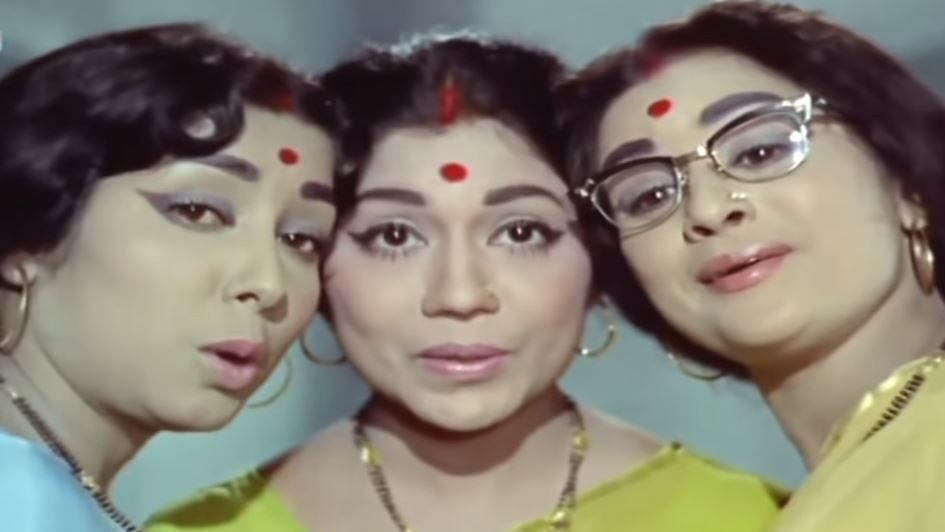When we think of Prithviraj Kapoor, we often think of him in larger-than-life terms — monarch of Hindi cinema, grandfather of Indian theatre, Akbar, Alexander. We don’t often think of him as the genial, albeit slightly sarcastic patriarch of an inane joint family who sings and dances with his grandkids, makes his grown sons stand on a bench as punishment when they misbehave and sends mischievous anonymous letters to his daughters-in-law so that they stop acting like fools.
Yet this is exactly what we get in Teen Bahuraniyan (1968), a quirky comedy that is, in many ways, a great way to remember, on his birth anniversary, Prithviraj Kapoor.
An ode to the middle-class life
Dinanath (Kapoor, credited simply as Prithviraj), a retired schoolteacher, has three sons: Shankar (Agha), a music teacher; Ram (Ramesh Deo), a High Court clerk and Kanhaiya (Rajendranath), a salesman in a pharma company. Shankar is married to Parvati (Sowcar Janaki), Ram is married to Sita (Kanchana) and Kanhaiya’s wife is Radha (Jayanthi), and then there’s an assortment of children. Each unit has its demarcated portion of the house and they all live together rather peacefully and happily.
All is good in the hood, until the arrival of their neighbour, the famous actor Sheela Devi (Shashikala). She accepts their invitation to come over for tea and this gets the bahus and their husbands so excited that the entire house is turned upside down. New clothes are bought, jewellery is borrowed, the three different parts of the house are repainted and various expensive items are borrowed or bought via instalments — all to show Sheela Devi that this family is worthy of her friendship.
Of course, this completely upsets the family’s bank balance (all three sons dutifully hand over their salary to Dinanath every month) and mental balance, as things take a turn for the inane — imagine Parvati hiding three of her five children in another room because she doesn’t want the actor to think she’s old and you’ll know what kind of exaggerated spoofy fun this movie is about.
The bahus compete with each other for Sheela Devi’s attention, much to the irritation of Dinanath and the helplessness of their husbands. But the twist comes when the husbands, apart from being big fans, decide that they, too, want to take advantage of their newfound acquaintance — if Ram harbours secret dreams of appearing in a movie, Kanhaiya wants the actor to be a brand ambassador for his company’s new headache medicine. Sheela Devi, meanwhile, enlists Shankar as her music teacher, which he is only too happy to be, provided no one finds out, because he knows Parvati wouldn’t like it (their own romance began when he was her music teacher).
Bahus who compete with each other yet stay united
You’d imagine that a story about three bahus who compete with each other would, at some point, turn into something unpleasant, perhaps sexist in its portrayal of women as conniving schemers. But Teen Bahuraniyan, thankfully, steers clear of that.
The movie opens with an argument about who gets to serve Dinanath tea on his birthday, and there’s a song portraying the three bahus doing the household chores together, happy in each other’s company.
Even when the women begin to vie for Sheela Devi’s affections, there is a sweet sense of solidarity among them — for example, when Parvati shows the other two the diamond necklace she has borrowed from a friend, she tells them she will quietly pass it to the next one whose portion of the house the actor is visiting, and so on, so they can each take turns to wear it. When they are all out of money, having spent it all on impressing the celebrity neighbour, they laugh about it together and borrow from each other.
And when Dinanath, sick and tired of the shenanigans his children are up to, sends each bahu an anonymous letter saying one of the husbands is having an affair with Sheela Devi, the bahus band together to teach their hapless (and entirely faithful) husbands a lesson.
At almost three hours, with multiple songs, the movie will feel overlong and a bit tedious to today’s audiences. But if you can get past that and understand the zany tone of the humour, it’s an enjoyable weekend watch. A nice leitmotif that runs throughout is the use of a chalkboard on which one of the kids writes a little summary of something that just happened or an observation. It’s a sweet nod to Dinanath’s time as a teacher.
Ultimately, of course, everything gets sorted out and all the loose ends are tied up, as Dinanath delivers a homily on why he did what he did. The film, then, is a sweet, if sometimes inane lesson on learning to live within your means and being happy with what you have, not being so insecure that you put on an act for anyone, and staying together as a family.
Also read: Dhool Ka Phool: Nehruvian secularism of Yash Chopra’s first movie is worth remembering today
